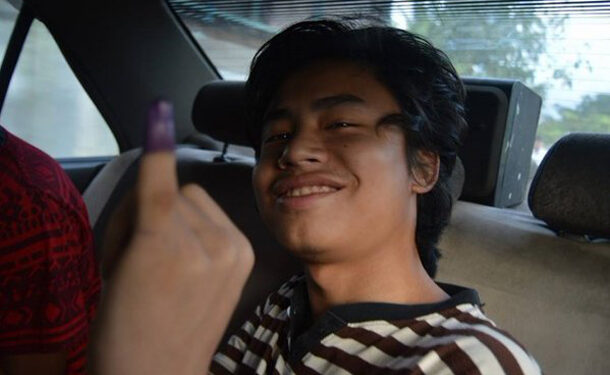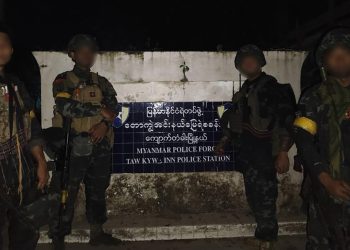RANGOON — Nan Lin, the chairman of the Dagon University Student Union in Rangoon, has been arrested after six months on the run and sent to remand in Insein Prison for his involvement in a protest against the political role of Burma’s military.
The student leader, who made headlines on Nov. 8 for successfully voting in Burma’s general election despite being sought by authorities, was arrested near Maha Bandoola Garden on Monday afternoon by plainclothes police officers and sent straight to Pabedan Township Court for a hearing to authorize his detention.
An arrest warrant was issued against Nan Lin, along with fellow students Paing Ye Thu and Zayar Lwin, after the three organized a July 1 demonstration against Article 436 of the Constitution, which prevents constitutional amendments without the support of more than 75 percent of the Union Parliament. With military appointees allocated a quarter of parliamentary seats, the article effectively grants a veto on amendments to the Burma Armed Forces.
A proposal to lower the threshold required under Article 436 to 70 percent of lawmakers was defeated during a joint sitting of the Union Parliament on June 25. The military bloc is believed to have voted uniformly against the measure.
Phoe Thar, a communication officer of Dagon University Student Union confirmed Nan Lin’s arrest to The Irrawaddy on Tuesday and said that he and the other two students, who were already in custody, had been charged under Section 505(b) of the Penal Code. The provision, which prohibits incitement, carries a maximum sentence of two years’ imprisonment.
Kyaw Hoe, lawyer for Paing Ye Thu and Zayar Lwin, said that the trio were facing criminal charges in both Pabedan and Kyauktada townships for the Theingyi Market protest. Both courts can issue punishments independently of each other’s verdict, meaning all three defendants face a maximum four-year sentence.
“They were being charged for their speeches related to constitutional amendment,” Kyaw Hoe said. “[It was alleged that] those speeches harmed stability and incited violence.”
“Speaking of constitutional amendments, Article 436 and whether the military should not be in parliament are common topics discussed by newspapers and the community. The National League for Democracy and 88 Generation Peace and Open Society also held public talks and collected signatures for a petition on these topics. So it is clear that what the group said is not out of the ordinary.”
Last year, a campaign by the NLD and 88 Generation activists calling for the abolition of the military’s constitutional veto collected over 5 million signatures from voters across the country.
Nan Lin was able to attend a polling station in Yankin on Nov. 8 to cast a ballot in Burma’s general election, despite attempts by local police to ascertain his whereabouts since the July protest. He told The Irrawaddy at the time that he had evaded recognition, even amid a heightened police presence on the streets of Rangoon during the poll, by donning a baseball cap.
“This election is about change for the country,” he said at the time. “Democratic forces and ethnic alliances need to win this election. I am a citizen and my job is to vote, that is what I believe. To catch me is other people’s job.”
Nan Lin and the other two protesters originally faced additional charges under the Peaceful Assembly Law, which have not been presented to the court.

















